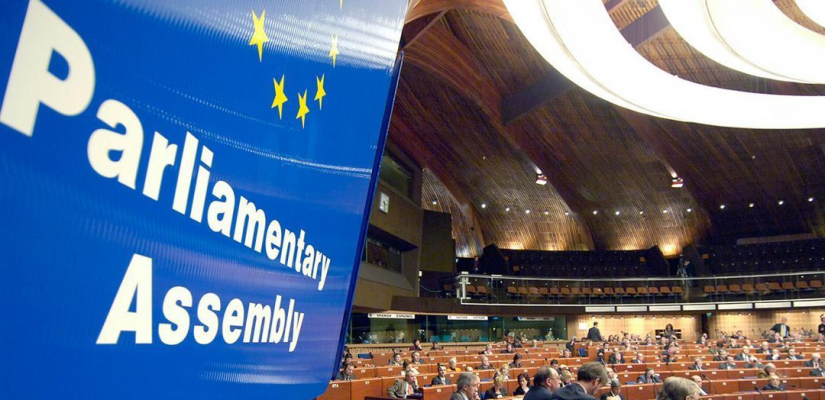Russia adds 4 politicians under EU sanctions to its first ‘delegation’ if Council of Europe gives in to blackmail

Four of the 18 members of the ‘delegation’ which Russia is hoping will be ‘triumphantly reinstated’ in the Parliamentary Assembly of the Council of Europe [PACE] on 24 June are under personal sanctions for their role in Russia’s aggression against Ukraine. This brazen disregard for EU directives is just a taster of things to come if PACE delegates adopt a resolution which will effectively remove the sanctions imposed upon Russia after its invasion and annexation of Crimea.
The vote on 24 June is to adopt or reject a draft resolution passed by the Rules Committee on 3 June. The resolution assiduously avoids mentioning Russia, although it is the latter which first stands to benefit if it is passed. Other beneficiaries in the future will be any country who commits acts of aggression, gross human rights violations, etc. since the amended rules will make it very much harder to impose sanctions upon them. The draft resolution was accompanied by an explanatory memorandum drawn up by Rapporteur Petra De Sutter (from Belgium).
Russia announced on 19 June that it had formed its delegation which would take part in the PACE session if the resolution (which was referred to as De Sutter’s report) was adopted. Konstantin Kosachev, head of the Council of the Federation (or senate) committee on international relations, asserted that “if the Assembly votes for the De Sutter report, it will recognize the errors of its previous actions with regard to the Russian Federation”. State Duma Speaker Vyacheslav Volodin said that if PACE adopted the De Sutter report “without any exceptions” on 24 June, Russia would, that very same day, apply to take part in the June session.
The ‘delegation’ they planned to send if the resolution went through includes seven senators and 11 deputies of the lower house of parliament, the State Duma. He saw fit to omit the fact that four of these Duma deputies are under EU sanctions, as well as a varying number of other countries’ sanctions.
Leonid Slutsky (or Slutski) came under EU sanctions on 17 March 2014 for “actively supporting the use of Russian Armed Forces in Ukraine and the annexation of Crimea”.
Judging by the risk advisory table here, he is also under US; Canadian and other sanctions. A simple Google check, even in English, will make it quite clear why he was, and is, deemed to deserve such sanctions.
The other three deputies: Leonid Kalashnikov, First Deputy Chairman of the State Duma’s Committee on Foreign Affairs; Igor Lebedev, Deputy Speaker of the State Duma; and Svetlana Zhurova are 110, 114 and 116, respectively, on the list of those placed under EU sanctions on 12 September 2014. In each case, the sanctions were imposed because they voted for Russia’s illegal annexation of Crimea. All three appear to be under Canadian, Swiss and Norwegian sanctions as well.
It was Emanuelis Zingeris who first noted that these deputies were under EU sanctions and said that “it is obvious that Russia tries to use the PACE to bypass these EU personal sanctions.” He went on to stress that Russia has not fulfilled any PACE resolution on the situation in Ukraine, is not complying with the Minsk agreements and is continuing its aggressive behaviour in respect of Ukraine.
As reported here, the human rights situation in Crimea has gravely deteriorated under Russian occupation, with at least 115 Ukrainian political prisoners held in Crimea or Russia and particular persecution of Crimean Tatars.’
See: A High Human Rights Price if the Council of Europe capitulates to Russia
The inclusion of sanctioned politicians in a first delegation would not be the end of Russian flouting of EU rules. TV Dozhd reported on 13 June that “The Russian delegation plans to return to PACE with deputies from Crimea”. One of the channel’s unnamed sources claimed that Crimea was “a region of Russia” and that such illegal and sanctioned ‘deputies’ would be fully entitled to represent Russia at PACE.
They would certainly not be entitled to, unless PACE wishes to revoke all its previous resolutions on the subject and abandon its human rights values. The trouble is that with a high-ranking Russian politician having openly claimed that adoption of the resolution on 24 June would “recognize the errors of its previous actions with regard to the Russian Federation”, it will not only be Russia that sees the Council of Europe as having seriously given up on the principles it is called upon to uphold.





